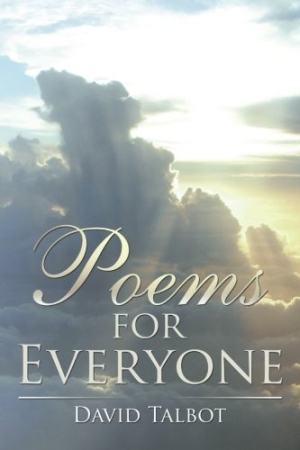It looks like you've stumbled upon a page meant to be read by our code instead of viewed directly. You're probably looking for this page.
Poems for Everyone
These poems are a diaristic portrait of a man’s creative process; the light verses are a gift.
David Talbot’s Poems for Everyone is a topically indiscriminate collection, a volume that reflects one man’s quest to understand his thoughts and feelings through poetry. Throughout this record of his journey, there are moments of surprising levity that feel truly original and special.
Talbot’s oeuvre includes light verse, experimental verse, narratives, lyrics, and public voice poems. The work shows a minor shift in style and themes over time: from childhood to war, and from holidays to politics. Poems about childhood move away from his own recollections toward general humorous verses for children, and then to poems written for his own children or grandchildren. The later poems begin delving into some eternal questions: the meaning of life; the nature of the world, faith, and death; and appreciation for the physical world.
As a collection, wide variation in style, tone, and occasion makes the volume more interesting as a kind of personal journal, a record of the author’s personal and artistic development over time. Most of the poems end with the author’s name and a date; the earliest poem in the collection was written when Talbot was twenty-nine years old, while the latest poem dates Talbot at eighty.
As ordered (alphabetically by title), the poems don’t have a clear narrative arc or sense of belonging together, and the waters are further muddied by several poems appearing more than once. Ultimately, what makes a poem belong seems to be simply its authorship, and the collection is more comprehensive than chronological or thematic.
It’s clear many of these poems have deep meaning for the author, but sans context, those meanings don’t always naturally convey themselves to the wider audience. Some poems are highly abstract, unmoored from narrative experiences, and stripped down to a list of descriptive phrases. It’s hard to find anchor in lines like those in “Etoile:”
Star…..tling
Sin…..king
Hope…..ing
Sub…..merging.
Chrysalis
Emerging
Imago
Flight
Light as loveliness
Like delight
As soft as kindness
Kindling love
Life.
Without context, such phrases seem ephemeral, rather than evocative.
Talbot excels at light verse, though, whether in humorous children’s poems, limericks, or doggerel. His preference for end rhymes creates a buoyancy that plays well with his sly humor.
In “Dissertation on Dessication,” which addresses a coconut, coconut milk is said to be “nice with rice / but there’s something phoney / when it’s mixed with macaroni,” and continues reveling in coconut desserts until the final lines’ emphatic, “Without any if’s or but’s / What a way to desecrate your nuts!”
Talbot states, “The beauty of writing poetry is that, when you read what you have written, you learn from them”; this is a fair self-assessment of his poems, which often read like discovery drafts.
The rawness of Talbot’s verses creates a diaristic portrait of one man’s creative process, but it also often makes the work less accessible for an audience. Among Talbot’s offerings, there may be something for everyone, with his light verses standing as the collection’s gift.
Reviewed by
Letitia Montgomery-Rodgers
Disclosure: This article is not an endorsement, but a review. The publisher of this book provided free copies of the book and paid a small fee to have their book reviewed by a professional reviewer. Foreword Reviews and Clarion Reviews make no guarantee that the publisher will receive a positive review. Foreword Magazine, Inc. is disclosing this in accordance with the Federal Trade Commission’s 16 CFR, Part 255.
